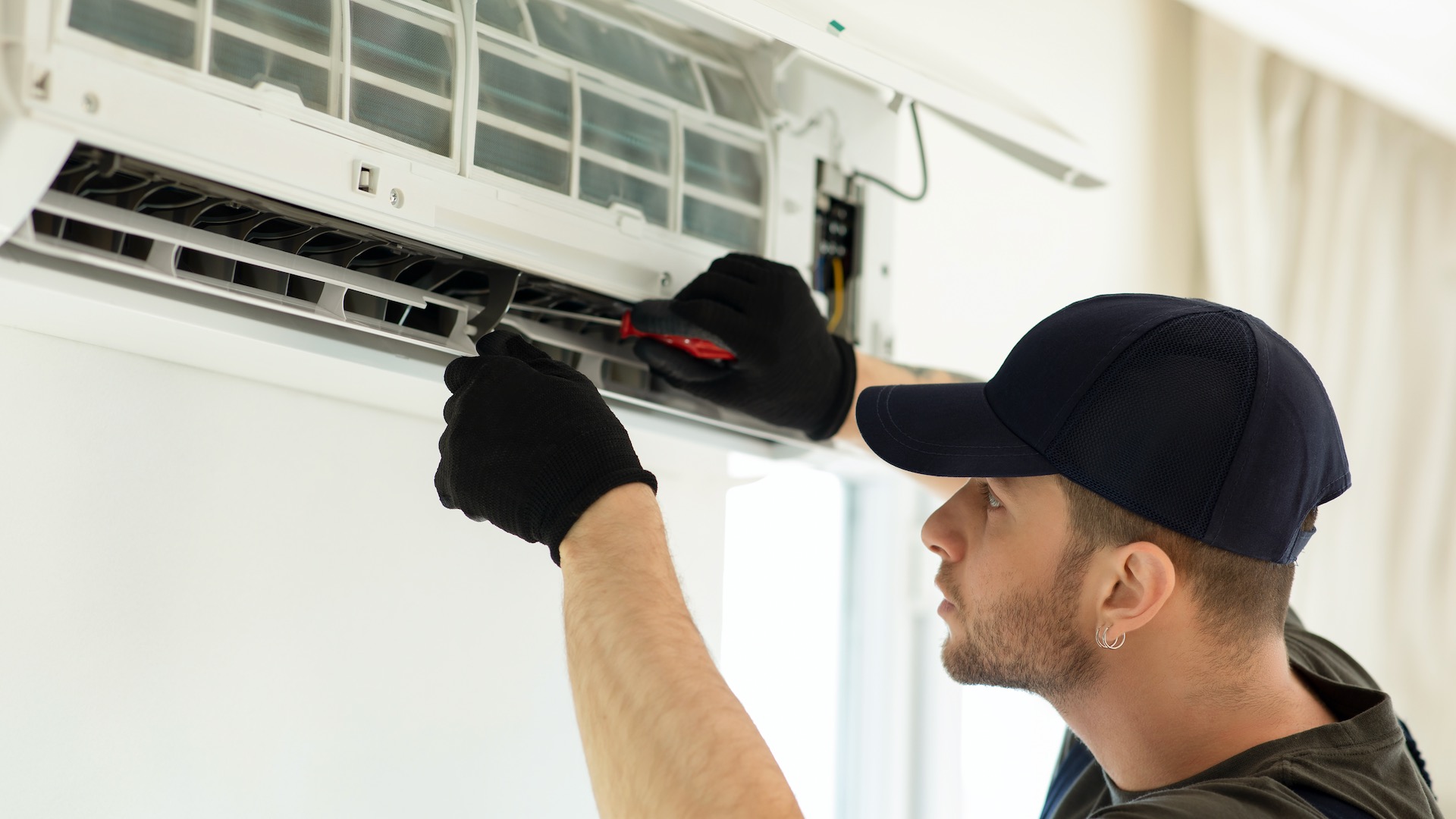Why is my air conditioner leaking water?
Whether that's inside or outside the house

Have you just looked up and spotted that your air conditioner is leaking water? Don't panic – there could be some harmless reasons why. Equally, it's wise to act quickly and check that it's not a sign of damage that could get worse.
"Many homeowners think that when their air conditioning unit goes out, it's due to a broken belt or something like that,' says Walter Bennett, a Texas-based handyman and engineer for Green Leaf Air. "But in reality, AC leaks are the most common cause of equipment failure in the summertime."
Even the best central air conditioning units can break down. But what is causing these leaks? Are there tell-tale signs to look for or ways to prevent them from happening? And if you do have a leak, what should you do about it? We have the answers to all these questions so you can take the best care of your AC.
1. The seal around the AC unit has worn down
The bulk of any air conditioning system – be it a window air conditioner, a central air conditioner, or a portable air conditioner – is manufactured from non-corrosive metal. However, some parts – including the seals – are made from rubber, which is initially less prone to leaking. Over time, these rubber seals get exposed to moisture or heat, which can cause them to dry out and either break up or crack.
This can allow air and/or refrigerant to leak out – and also creates other issues. "When the seal around the compressor is compromised, debris can get into the system and cause damage," Walter Bennett explains.
If you suspect your seal is broken, you'll need to call out a professional to replace it. First, check your warranty and see if the work is covered. Then act fast.
According to air conditioning distributors FCJ, "Neglecting to do so might allow moisture in to contaminate the system. When moisture mixes with refrigerant, an acid is formed which can break down other system components or can cause tiny pinhole leaks – a much more complex and costly repair than a simple O-ring replacement or rubber leak seal."
2. Wires are loose or broken
"Leaks can also occur when wires inside your AC unit become loose or broken. This creates heat problems, which in turn lead to leaks," says Walter.
Sign up to receive the latest news, reviews, buying guides and deals direct to your inbox
Wires can wear out over time or be damaged by power outages. Again, any rewiring or diagnosis should be taken on by a professional. It can be difficult to diagnose a wiring issue, but one telltale sign is that the unit often trips out your electrics. Check your fuse box to see if the circuit breaker for your unit is set to the off position.
You can prevent wiring problems from happening by ensuring you get the unit properly installed, and then regularly maintained.

3. Condensation or ice is forming in the cold
"In cold climates, condensation can form outside the AC unit,' says Walter Bennett. "This then drips down and creates leaks." Cold weather can also cause the evaporator coils to freeze. As they defrost, the water will drip down through the unit and onto the floor.
Atlanta Heating & Air Solutions recommends insulating your refrigerant lines – the pipes that transport refrigerant through your air conditioning system. "Most air conditioning systems have a low-pressure and a high-pressure refrigerant line. Of these two lines, you typically only need to insulate the former.
"Insulating the high-pressure refrigerant will protect against condensation. At the same time, it will ensure that the refrigerant remains at an appropriate pressure while it’s being carried to the condenser unit."
4. The drain line is clogged
"One of the most common reasons for an AC leak is a lack of maintenance," says Ryan Collier, an HVAC expert and company Director of Heat Pump Source. "When your AC unit isn't properly maintained, it can lead to a build-up of dirt and debris, which can eventually clog the drain line. This can cause water to back up and leak out of the unit."
To make sure this doesn't happen, the US Department of Energy recommends that you "Occasionally pass a stiff wire through the unit's drain channels."
If you suspect your condensate drain line is clogged and that the unit needs to be opened up, it's time to call a registered HVAC technician.
5. Poor installation
"If your AC unit wasn't installed properly, it could be the cause of your leaks," says Ryan Collier. "Make sure to hire a qualified professional to install your AC unit to avoid this issue."

6. There's a a crack in the unit
"Over time, wear and tear can cause cracks in your AC unit, which can lead to leaks," says Ryan Collier. "Inspect your unit regularly for any cracks or damage."
If you do find a crack, it's wise to call an engineer straight away to see if it can be repaired or if you'll need a replacement. It's not a good idea to patch up the crack – not least because the substance leaking from it might not be water, but toxic refrigerant. A home repair may also void your warranty.
What can I do to stop my air con from leaking?
Every expert we approached recommended a regular schedule of maintenance based on your system's operating manual and our guide to how to clean an air conditioner.
"Maintenance can be fairly simple," Shuhdi explains. "You should replace the air filter regularly – typically every 30 to 60 days. You also need to keep the condenser coil clean."
You may find that if it's hot and the unit is working hard, you may need to change the filter more regularly – as often as once a month.
Reviews
Whirlpool 24" Stainless Steel AI Dishwasher Review
Napoleon TravelQ PRO285 Portable Gas Grill review
Dreame L40 Ultra Robot Vacuum Cleaner and Mop review: almost hands-free cleaning
GE Profile Smart Mixer with Auto Sense review: a powerful, thorough mixer
Echo eForce DPB-2500 review: a leaf blower as a snow removal tool?
DPAS-2100 + Pro Paddle Attachment review: a new way to remove snow this winter?
Midea MAD53109APK 5.5QT Air Fryer review: a small, simple, and highly effective option
Eureka J15 Pro Ultra Robot Vacuum review: hands-free cleaning for busy families
You can clean your condenser coils using a brush and remove larger bits of debris by hand. You can then vacuum the coils and clean them with a spray solution of mild detergent and water. Always disconnect the power to your unit before you take on any cleaning.
"Maintaining a clean air filter prevents impurities such as dust from accumulating on the evaporator coil and ensures proper airflow. Maintaining a clean condenser prevents high refrigerant pressure caused by improper air flow," adds Shuhdi.
What should I do if my AC springs a leak?
Shuhdi Alrishood is an assistant director of education at the MIAT College of Technology and trains HVACR technicians.
"Repairs should be done only by a certified technician for safety reasons," he says. "The EPA requires AC technicians to obtain a section 608 certification, and local state regulations might require either a mechanical contactor license or that a technician work for a licensed contractor in order to perform installations and service."
Shuhdi explains what you should expect an engineer to do.
- Recover the remainder of the refrigerant.
- Pressurize the system with nitrogen and a traceable amount of refrigerant.
- Leak test the system with a leak tester or spray bubble to pinpoint the leak.
- Perform the proper repairs. Some leaks may require an evaporator or a condenser coil to be replaced.
- Repressurize the system with nitrogen and a traceable amount of refrigerant, test with a leak tester, and perform a standing pressure test.
- Evacuate the system to 500 microns. They may have to repeat this step based on refrigerant type.
- Recharge the system.
Amy Cutmore is Editor-in-Chief, Homes Audience, working across the Future Homes portfolio. She works on titles including Ideal Home, Homes & Gardens, Livingetc, Real Homes, Gardeningetc, Top Ten Reviews and Country Life. And she's a winner of the PPA's Digital Content Leader of the Year. A homes journalist for two decades, she has a strong background in technology and appliances, travelling the world in pursuit of the biggest TV screens, the smartest phones and – oh yes – the most efficient washing machines.
